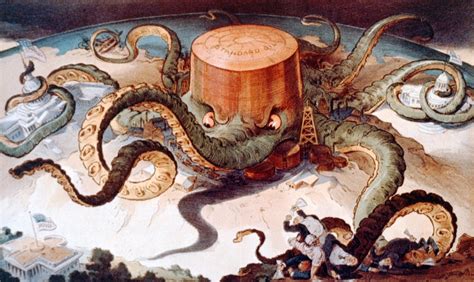Who was John D. Rockefeller?

John D. Rockefeller was an American industrialist and philanthropist who founded the Standard Oil Company in the late 19th century. He is widely regarded as one of the most successful and influential businessmen of all time.
Early Life and Career
- Born in Richford, New York, in 1839
- At age 16, quit school to become an assistant bookkeeper
- In 1863, founded the Standard Oil Company with a group of partners
- Rapidly expanded Standard Oil through mergers and acquisitions, creating a near-monopoly in the oil industry
Standard Oil Company
- Became the largest industrial company in the world by the turn of the 20th century
- Controlled nearly 90% of the oil refining industry in the United States
- Implemented innovative business practices, such as vertical integration and economies of scale
- Faced widespread antitrust lawsuits, which ultimately led to its breakup in 1911
Wealth and Philanthropy
- Accumulated an estimated net worth of over $1 billion, making him the richest man in America
- Donated significant portions of his wealth to charitable causes, particularly in the areas of education, medicine, and the arts
- Founded the Rockefeller Foundation in 1913, which continues to provide grants for research and public policy initiatives
Legacy and Impact
- Shaped the development of the American oil industry and the modern corporation
- Pioneered the use of business tactics that would become industry standards
- His philanthropy has had a profound impact on American society and global health
- Legacy remains controversial, with some criticizing his ruthless business practices and others praising his contributions to the economy and society
Vertical Integration
- Integrated all aspects of the oil industry under one company, from drilling to refining to distribution
- Allowed Standard Oil to control costs, increase efficiency, and reduce competition
Economies of Scale
- Utilized large refineries and pipelines to produce oil at lower costs
- Drove down prices for consumers and increased profitability
Marketing and Branding
- Developed aggressive marketing campaigns to promote Standard Oil products
- Created branded products, such as kerosene and gasoline, to differentiate them from competitors
Antitrust Challenges
- Standard Oil faced numerous antitrust lawsuits for its monopolistic practices
- The Sherman Antitrust Act of 1890 was specifically designed to breakup Standard Oil
- In 1911, the Supreme Court ordered the company to dissolve into 34 separate entities
Education
- Donated over $100 million to establish and support universities, such as the University of Chicago, Rockefeller University, and Spelman College
- Focused on providing access to higher education for women and underrepresented groups
Medicine
- Established the Rockefeller Foundation to fund medical research and public health initiatives
- Supported the development of vaccines, antibiotics, and sanitation programs
- Played a significant role in the eradication of diseases such as yellow fever and malaria
Arts and Culture
- Founded the Museum of Modern Art in New York City
- Donated funds for the restoration of historic monuments and landmarks
- Supported the work of artists, musicians, and writers
Customer Segmentation
- Rockefeller divided consumers into different segments based on their needs and wants
- Developed specific marketing campaigns and products for each segment
- Targeted low-income families with affordable kerosene for lighting
- Catered to wealthier individuals with high-quality gasoline for automobiles
Value Proposition
- Standard Oil’s value proposition focused on providing reliable, high-quality oil products at competitive prices
- The company emphasized efficiency, innovation, and customer service
- By meeting the diverse needs of its customers, Standard Oil gained a loyal following
Ignoring Regulatory Risks
- Rockefeller’s aggressive business practices attracted the attention of antitrust regulators
- Companies should be mindful of potential antitrust violations and develop strategies to mitigate risks
Overestimating Market Power
- Standard Oil’s near-monopoly led to a sense of complacency
- Companies should avoid becoming overly reliant on market dominance and continuously innovate to maintain a competitive edge
Neglecting Customer Feedback
- Rockefeller’s focus on efficiency sometimes came at the expense of customer satisfaction
- Companies should prioritize customer feedback and make adjustments to their products and services accordingly
Failing to Plan for Succession
- Rockefeller’s retirement left Standard Oil without a clear successor
- Companies should develop succession plans to ensure a smooth transition of leadership
John D. Rockefeller’s legacy is complex and multifaceted. He was a visionary businessman who transformed the oil industry and amassed an unprecedented fortune. However, his ruthless business practices and the breakup of Standard Oil left a lasting impact on antitrust laws and corporate governance. Despite these controversies, Rockefeller’s philanthropic contributions have had a transformative effect on education, medicine, and the arts. By studying his strategies, successes, and failures, we can gain valuable insights into the evolution of business and the power of philanthropy.
